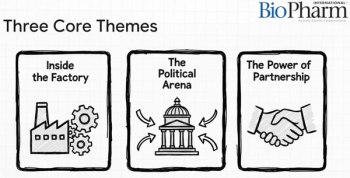BioNTech SE and Bristol Myers Squibb (BMS) have entered a global co-development and co-commercialization agreement valued at up to $11.1 billion for BNT327, BioNTech’s investigational bispecific antibody targeting programmed death-ligand 1 (PD-L1) and vascular endothelial growth factor A (VEGF-A) (1). Under the deal, BMS will provide BioNTech with an upfront payment of $1.5 billion and an additional $2 billion in non-contingent anniversary payments through 2028. BioNTech is also eligible to receive up to $7.6 billion in development, regulatory, and commercial milestones.
The agreement includes equal sharing of development and manufacturing costs, as well as global profits and losses, subject to certain exceptions. Both companies will jointly advance BNT327 in multiple indications, while retaining the right to pursue additional clinical development independently, including combination strategies with proprietary assets.
Next-generation bispecific antibody in late-stage trials
Key Takeaways
- $11.1 billion BioNTech–Bristol Myers Squibb deal highlights growing investment in bispecific antibody development for solid tumor immuno-oncology therapies.
- Manufacturing and development costs for BNT327 will be shared 50/50, emphasizing scalable global production strategies in late-stage oncology pipelines.
- BNT327’s dual-targeting of PD-L1 and VEGF-A advances bispecific antibody design, aiming for improved tumor microenvironment modulation and precision.
BNT327 is a clinical-stage bispecific antibody that integrates two validated oncology targets—PD-L1 and VEGF-A—within a single molecule (2). The compound is currently being studied in more than 20 clinical trials involving more than 1000 patients, including global Phase III trials for first-line treatment of extensive-stage small cell lung cancer and non-small cell lung cancer. A Phase III trial in triple-negative breast cancer is scheduled to begin by the end of 2025.
Designed to simultaneously address immune checkpoint inhibition and tumor vasculature remodeling, BNT327 aims to enhance localized anti-tumor activity while reducing systemic exposure (1). This mechanism of action could allow the molecule to serve as a backbone immunotherapy across a range of solid tumors.
“We believe BNT327 has the potential to become a foundational immuno-oncology backbone, moving beyond single-mechanism checkpoint inhibitors and expanding into multiple solid-tumor indications,” said Ugur Sahin, MD, CEO and co-founder of BioNTech (1). “Our collaboration with BMS, a pioneering leader in immuno-oncology, aims to accelerate and broadly expand BNT327’s development to fully realize its potential. Our focus remains on advancing high-impact, pan-tumor programs and combination strategies in oncology, with BNT327 complementing our antibody-drug conjugate programs and mRNA [messenger RNA]-based immunotherapies. We are dedicated to delivering truly transformative options for patients in need."
Mechanistic strategy and clinical development outlook
BNT327 combines PD-L1 checkpoint inhibition with VEGF-A neutralization (1). This dual mechanism is intended to restore T-cell function while also disrupting the tumor’s blood supply and reversing immunosuppressive features of the tumor microenvironment. The molecule’s design enables localized activity within the tumor, potentially improving the delivery and efficacy of co-administered therapies.
“Our deep experience and expertise in advancing and delivering groundbreaking immuno-oncology medicines positions BMS well to collaboratively realize the potential of BNT327, an asset with significant potential for transforming the standard of care for patients with solid tumors,” said Christopher Boerner, PhD, board chair and CEO of BMS (1). “The science behind BNT327 and its leading clinical position in multiple hard-to-treat tumor types, further bolsters our pursuit of novel mechanisms and multiple modalities in oncology and enhances our growth trajectory. We are impressed by the innovation that BioNTech has achieved to date, and we look forward to partnering to accelerate existing clinical trials and time to market, while expanding the number of potential indications.”
BioNTech expects BNT327 to play a central role in future combination regimens, including with its own pipeline of antibody-drug conjugates. In addition to trials in lung and breast cancers, further studies are planned in over 10 solid tumor indications. The molecule’s targeted mode of action is also being explored for its potential to normalize tumor vasculature, improving access and response to combination therapies.
References





